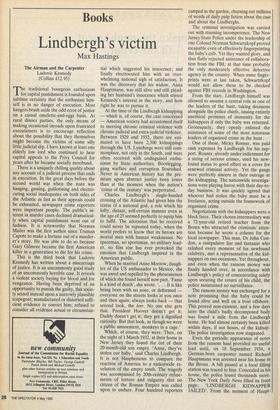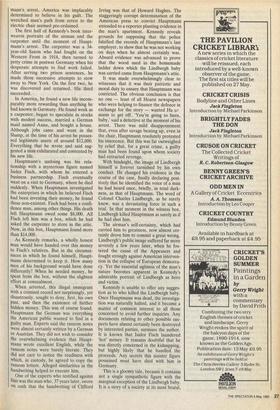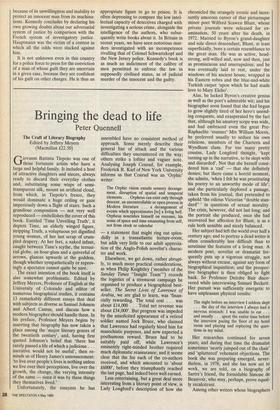Books
Lindbergh's victim
Max Hastings
The Airman and the Carpenter Ludovic Kennedy (Collins £12.95) rr he traditional bourgeois enthusiasm for capital punishment is founded upon sublime certainty that the enthusiast him- self is in no danger of execution. Most hangers brush aside the odd error of justice on a casual omelette-and-eggs basis. At rural dinner parties, the only means of making occasional inroads upon frustrated executioners is to encourage reflection about the possibility that they themselves might become the victims of some silly little judicial slip. I have known at least one elderly law lord who continued to hear capital appeals to the Privy Council for years after he became socially moribund.
There is a uniquely chilling quality about any account of a judicial process that ends in execution. In the great days before the second world war when the state was hanging, gassing, guillotining and electro- cuting social inadequates on both sides of the Atlantic as fast as their appeals could be exhausted, newspaper crime reporters were important people. The public's in- terest in murder cases declined dramatical- ly when capital punishment went out of fashion. It is noteworthy that Norman Mailer was the first author since Truman Capote to make a fortune out of a murder- er's story. He was able to do so because Gary Gilmore became the first American killer in a generation to die for his crime.
This is the third book that Ludovic Kennedy has written about a miscarriage of justice. It is an uncommonly good study of an uncommonly horrible case. It reveals a violent society baying for blood and for vengeance. Having been deprived of an opportunity to punish the guilty, this socie- ty seized instead upon a narrowly plausible scapegoat; manufactured or distorted suffi- cient evidence to convict him; refused to consider all evidence actual or circumstan- tial which suggested his innocence; and finally electrocuted him with an over- whelming national sigh of satisfaction. It was the discovery that his widow, Anna Hauptmann, was still alive and still plead- ing her husband's innocence which stirred Kennedy's interest in the story, and how right he was to pursue it.
At the time of the Lindbergh kidnapping — which is, of course, the case concerned — American society had accustomed itself to meeting chronic criminal violence with chronic judicial and extra-judicial violence. Between 1929 and 1932, there are esti- mated to have been 2,500 kidnappings through the US. Lynchings were still com- monplace, not only in the South, and were often received with undisguised enthu- siasm by State authorities. Bootlegging, gang warfare and corruption flourished. Never in American history has the pre- mium upon abstract justice been lower than at the moment when the nation's 'crime of the century' was perpetrated.
Charles Lindbergh's single-handed crossing of the Atlantic had given him the status of a national god, a role which his lofty, distant, self-certain manner even at the age of 25 seemed perfectly to equip him to fulfil. The adoration that he received could never be repeated today, when the world prefers to know that its heroes are mortal men with human weaknesses. No spaceman, no sportsman, no military lead- er, no film star has ever provoked the emotion that Lindbergh inspired in the American public.
When he married Anne Morrow, daugh- ter of the US ambassador to Mexico, she was awed and repelled by the phenomenon of which she found herself now part. 'Fame is a kind of death', she wrote.', . . It is like being born with no nose, or deformed — everyone on the streets looks at you once and then again; always looks back — that second look, the leer. No one else gets that. President Hoover doesn't get it; Daddy doesn't get it; they get a dignified curiosity. But that look, as though we were a public amusement, monkeys in a cage.'
Which, of course, they were. Then, on the night of 1 March 1932, at their home in New Jersey they found the cot of their 20-month-old son empty. 'Anne, they've stolen our baby,' said Charles Lindbergh.
It is not blasphemous to compare the reaction of America to a nationwide re- velation of the empty tomb. The tragedy was accompanied by 20th-century refine- ments of torture and vulgarity that no citizen of the Roman Empire was called upon to endure. Four hundred reporters camped in the garden, churning out millions of words of daily pulp fiction about the case and about the Lindberghs.
The criminal investigation was carried out with stunning incompetence. The New Jersey State Police under the leadership of one Colonel Norman Schwartzkopf proved incapable even of effectively fingerprinting the baby's crib. Yet they wanted glory, and thus flatly rejected assistance of collabora- tion from the FBI, at that time probably the only moderately effective detective agency in the country. When some finger- prints were at last taken, Schwartzkopf would not allow these to be checked against FBI records in Washington.
From the start, Lindbergh himself was allowed to assume a central role as one of the leaders of the hunt, taking decisions alongside the police chiefs, issuing entirely unethical promises of immunity for the kidnappers if only the baby was returned. Grotesquely, they openly enlisted the assistance of some of the most notorious leaders of organised crime in the hunt.
One of these, Micky Rosner, was paid cash expenses by Lindbergh for his sup- port. Rosner, already under indictment for a string of serious crimes, used his new- found status to good effect as a cover for renewed criminal activity. Yet the gangs were perfectly sincere in their outrage at the kidnapping. The nationwide investiga- tions were playing havoc with their day-to- day business. It was quickly agreed that whoever had stolen the baby must be a freelance, acting outside the framework of organised crime.
Negotiations with the kidnappers were a black farce. Their chosen intermediary was a 72-year-old retired teacher from the Bronx who attracted the criminals' atten- tion because he wrote a column for the local newspaper. This man, Dr John Con- don, a compulsive liar and fantasist who relished every moment of his newfound
celebrity, met a representative of the kid- nappers on two occasions. Yet throughout,
and even when the ransom money was finally handed over, in accordance with Lindbergh's policy of concentrating solely upon securing the return of his child, the police maintained no surveillance.
The ransom money was exchanged for a note promising that the baby could be found alive and well on a boat offshore.
This proved non-existent, and a few days later the child's badly decomposed body was found a mile from the Lindbergh home. He had almost certainly been killed within days, if not hours, of the kidnap. The police investigation now stagnated.
Even the periodic appearance of notes from the ransom haul provided no useful lead until, on 18 September 1934, a German-born carpenter named Richard Hauptmann was arrested near his home in the Bronx. A bill passed at a local filling station was traced to him. Concealed in his house, the police found thousands more.
The New York Daily News filled its front page: 'LINDBERGH KIDNAPPER JAILED'. From the moment of Haupt-
mann's arrest, America was implacably determined to believe in his guilt. The wretched man's path from arrest to the electric chair seemed pre-ordained.
The first half of Kennedy's book inter- weaves Portraits of the airman and the carpenter until the moment of Haupt- mann's arrest. The carpenter was a 34- year-old Saxon who had fought on the Western Front in 1918, then turned to petty crime in postwar Germany when his desperate attempts to find work failed. After serving two prison sentences, he made three successive attempts to stow away to New York. On the first two, he was discovered and returned. His third succeeded.
In America, he found a new life incom- parably more rewarding than anything he had known in Germany. He found work as a carpenter, began to speculate in stocks with modest success, married a German maid named Anna, and bought a house. Although jobs came and went in the Slump, at the time of his arrest he posses- sed legitimate assets of around $12,000. Everything that he wrote and said sug- gested a man exhilarated and contented by his new life.
Hauptmann's undoing was his rela- tionship with a mysterious figure named Isidor Fisch, with whom he entered a business partnership. Fisch eventually went on a visit to Germany, where he died suddenly. When Hauptmann investigated the enterprises in which he believed Fisch had been investing their money, he found these non-existent. Fisch had been a confi- dence man, among other things. His death left Hauptmann owed some $8,000. All Fisch left him was a box, which he had asked the carpenter to store in the attic. Now, in this box, Hauptmann found more than $14,000.
As Kennedy remarks, a wholly honest man would have handed over this money to Fisch's relatives. But in the circumst- ances in which he found himself, Haupt- mann determined to keep it. How many Men of his background would have done differently? When he needed money, he spent from the box, without the slightest effort at concealment.
When arrested, this illegal immigrant with a criminal record not surprisingly, yet disastrously, sought to deny, first, his own Past, and then the existence of further hidden money. This was of course found.
Hauptmann the German was everything the American public wanted to find in a
guilty man. Experts said the ransom notes were almost certainly written by a German or Austrian. They did not wish to consider the overwhelming evidence that Haupt- mann wrote excellent English, while the ransom notes were barely literate. They did not care to notice the readiness with Which, in custody, he agreed to copy the ransom letters. Alleged similarities in the handwriting helped to execute him.
One of the experts who testified against him was the man who, 37 years later, swore on oath that the handwriting of Clifford Irving was that of Howard Hughes. The staggeringly corrupt determination of the American press to convict Hauptmann extended to a reporter planting evidence in the man's apartment. Kennedy reveals grounds for supposing that the police falsified the records of Hauptmann's last employer, to show that he was not working on days when he almost certainly was.
Absurd evidence was advanced to prove that the wood used in the homemade ladder down which the Lindbergh baby was carried came from Hauptmann's attic.
It was made overwhelmingly clear to witnesses that it was their patriotic and moral duty to ensure that Hauptmann was convicted. The obvious conclusion is that no one — least of all Hearst newspapers who were helping to finance the defence in exchange for the story — wanted Ha cir mann to get off. 'You're going to burn, baby,' said a detective at the moment of his arrest. There was mild disappointment that, even after savage beating up, even in the chair, Hauptmann resolutely protested his innocence. But this was far outweighed by relief that, for a great crime, a guilty man had been found upon whom society had extracted revenge.
With hindsight, the image of Lindbergh himself is forever tarnished by his own conduct. He changed his evidence in the course of the case, finally declaring posi- tively that he identified the voice of a man he had heard once, briefly, in total dark- ness, as that of Hauptmann. The word of Colonel Charles Lindbergh, as he surely knew, was a devastating force in such a trial. In that moment in the witness box, Lindbergh killed Hauptmann as surely as if he had shot him.
The airman's self-certainty, which had carried him to greatness, now almost cer- tainly drove him to commit a great wrong. Lindbergh's public image suffered far more severely a few years later, when he fos- tered the cause of the Appeasers and fought strongly against American interven- tion in the collapse of European democra- cy. Yet the essential ugliness of the man's nature becomes apparent in Kennedy's admirable portrait of Lindbergh as hero and victim.
Kennedy is unable to offer any sugges- tion as to who killed the Lindbergh baby. Once Hauptmann was dead, the investiga- tion was naturally halted, and it became a matter of common interest to all those concerned to avoid further inquiries. Any documents relating to other possible sus- pects have almost certainly been destroyed by interested parties, surmises the author. It is known that Isidor Fisch laundered 'hoe money. It remains doubtful that he was directly concerned in the kidnapping, but highly likely that he handled the proceeds. Any secrets this sinister figure possessed must have died with him in Germany.
This is a gloomy tale, because it contains not a single sympathetic figure with the marginal exception of the Lindbergh baby. It is a story of a society at its most brutal, because of its unwillingness and inability to protect an innocent man from its machina- tions. Kennedy concludes by declaring his own growing doubts about our adversarial system of justice by comparison with the French system of investigatory justice. Hauptmann was the victim of a contest in which all the odds were stacked against him.
It is not unknown even in this country for a police force to press for the conviction of a man of whose guilt they are uncertain in a given case, because they are confident of his guilt on other charges. He is thus an appropriate figure to go to prison. It is often depressing to compare the low intel- lectual capacity of detectives charged with investigating a serious crime, alongside the intelligence of the authors, who subse- quently write books about it. In Britain in recent years, we have seen notorious mur- ders investigated with an incompetence rivalling that of Colonel Schwartzkopf and the New Jersey police. Kennedy's book is as much an indictment of the calibre of men permitted to enforce the law in supposedly civilised states, as of judicial murder of the innocent and the guilty.




















































 Previous page
Previous page